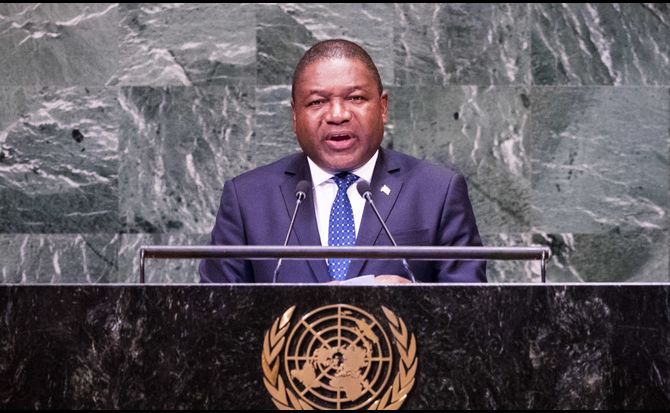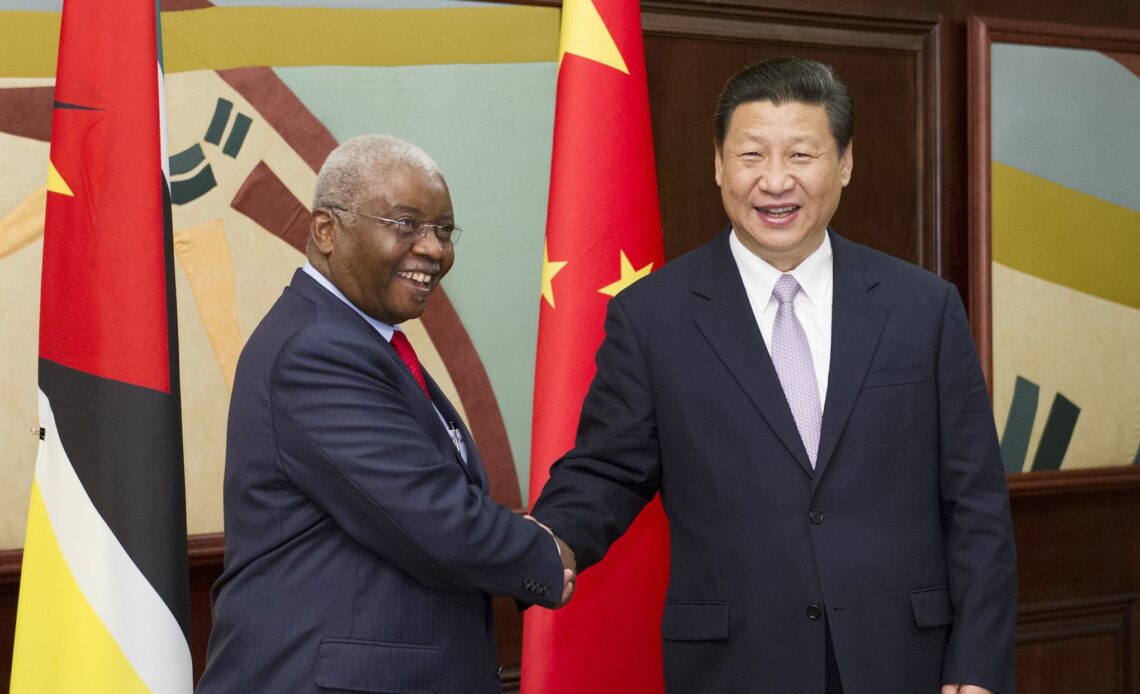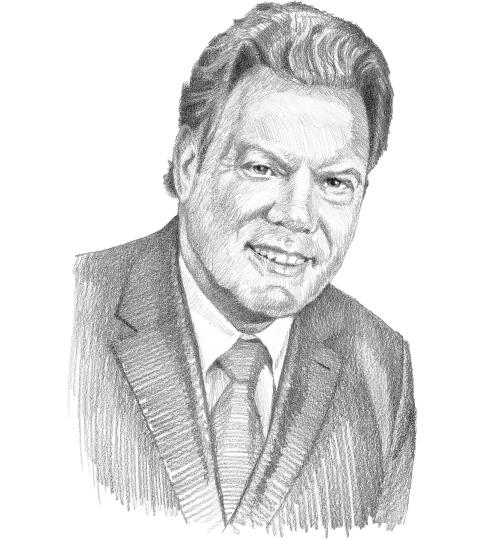Mozambique: The biggest corruption case in Africa
A $2 billion corruption scandal continues to upend the political and economic landscape in Mozambique. Manuel Chang, the former finance minister, has been arrested by U.S. authorities along with co-conspirators. Extradition to the U.S. could implicate more Mozambican officials and cause a turn back on the flow of international aid.

In a nutshell
- US authorities have arrested the former Mozambican finance minister, Manuel Chang, and several foreign bankers
- The sprawling fraud case has unearthed corruption in Mozambique and threatened aid and foreign investment
- Chang now faces possible extradition to the U.S., as politicians angle in advance of October elections
On December 29, 2018, Manuel Chang, the former Mozambican finance minister, was arrested in Johannesburg’s O. R. Tambo Airport while in transit to Dubai. South African police were acting under an indictment filed by United States prosecutors, issued by a New York grand jury. Days later, under the same indictment, British authorities arrested three former Credit Suisse bankers: Andrew Pearse, Surjan Singh and Detelina Subeva. In New York, Jean Boustani, an executive at the holding company Privinvest, was also arrested.
The charges against Mr. Chang concern a series of loans he signed, on behalf of the Mozambican government, to secure financing to three state-owned companies: EMATUM, a fishing company, and the maritime security firms ProIndicus and MAM (Mozambique Assets Management).
Ostensibly, the loans were made to these companies to acquire patrol vessels. But they have been revealed as part of a complex scandal that has become Africa’s biggest corruption case in decades.
Shady deals
The fraudulent scheme, involving an estimated $2 billion, was orchestrated between Mozambican officials and executives from Credit Suisse and Russia’s VTB Capital Bank. American prosecutors allege that the three state-owned Mozambican companies were used to divert at least $200 million to the defendants and senior Mozambican officials.
The French-Lebanese industrialist Iskandar Safa was also involved. His company, the Abu Dhabi-based Privinvest, is the main shareholder of Constructions Mecaniques de Normandie (CMN), located at the Cherbourg shipyard, where the boats sold to Mozambique for the operation were partly built.
The EMATUM deal became public in September 2013, when CMN announced the contract for the construction of several patrol boats, which, at first, did not present concerns. Suspicions arose when the public was made aware that EMATUM’s $850 million loan was secured against state guarantees.
From 2015 to 2016, Mozambique’s public debt rose from 86 percent to 130 percent of GDP.
The other loans – $622 million for ProIndicus and $535 million for MAM – were revealed in 2016, when a hidden $1.4 billion in Mozambican debt was discovered in the midst of the International Monetary Fund’s assistance program to the country. The IMF decided to freeze its loans to Mozambique and international donors suspended aid to the country, which had been crucial in balancing its budget throughout the years.
The arrests so far involve only the cases related to EMATUM and ProIndicus, whose loans were granted by Credit Suisse. MAM’s debt was contracted with VTB, and there are no known developments as to the investigation involving the Russian bank.
Collateral damage
This fraud compromised the country’s financial credibility and caused serious damage to its economy – to local banks that acquired related debt, companies and the public. From 2015 to 2016, Mozambique’s public debt rose from 86 percent to 130 percent of gross domestic product (GDP).
The fact that European banks (Credit Suisse and VTB) were involved gave the case major publicity, with Europeans and Americans discussing the culpability of Western financial institutions in the corruption of African leaders.
Credit Suisse has already made a statement in response to the scandal, declaring that it bears no responsibility and that its former executives who have now been charged acted independently, by manipulating internal rules.
Accomplices and protectors
For his part, Mr. Chang stands accused of conspiracy to commit wire and securities fraud and conspiracy to commit money laundering. On January 8, he was presented to a Kempton Park Court, South Africa, where magistrate Sagra Subrayen confirmed the arrest and decided in favor of the U.S. Justice Department’s demand for his extradition.
Mr. Chang’s defense team then appealed, and in April, the court again ruled that he may be extradited to the U.S. The court will next consider Mozambique’s request to extradite him, although South Africa’s justice minister, Michael Masutha, will make the final determination.
The “ghost loans” case has been called the biggest corruption scandal in sub-Saharan Africa since the 1960s.
Mr. Chang’s arrest caused a wave of fear and rumors among Mozambique’s nomenklatura. He could not have acted alone and likely had accomplices and “protectors” in the country’s top hierarchy at the time of the loan operation. It is known that $200 million was generously distributed among politicians and senior bureaucrats as commissions and kickbacks to get the approval and necessary silence for the operation.
According to the indictment, more names are involved but have not yet been made public, feeding rumors that point to both probable culprits and others that had nothing to do with the fraud. Signals coming from civil society (especially from critics of former president Armando Guebuza and of the ruling FRELIMO party) and echoing in the independent media suggest that the people were eager to hold corrupt politicians and officials to account. In February, former SISE (security service) officials like Gregorio Leao and Antonio do Rosario were also arrested.
Electoral calculations
In an election year, for both president and the legislature, such a corruption scandal should present a golden opportunity for the opposition. But instead, it has remained mostly silent about the situation.
RENAMO, the leading opposition party, held its congress in mid-January to elect the successor to leader Afonso Dhlakama, who died in May 2018. The winner was General Ossufo Momade, who was already serving as the party’s interim president. RENAMO has been focusing on its own restructuring after the death of its former leader and founder, and on concluding the integration of former guerillas into the army and police.
The other opposition party, the Democratic Movement of Mozambique, known by its Portuguese abbreviation MDM and led by Davis Simango, has also shown no enthusiasm or ability to take advantage of the situation.

But any political exploitation of the case will most likely come from civil society, the independent media and even from the ranks of FRELIMO itself. In the case of the latter, it will come mainly from the cadres and militants who have nothing to do with the issue, innocent of charges and scandalized by corruption and its impact on the party.
The “ghost loans” case has been called the biggest corruption scandal in sub-Saharan Africa since the 1960s. The fact that a foreign entity – and an American court, at that – was needed to push the investigation forward and for some results to surface indicates the level of fear and caution surrounding the matter within Mozambique. British authorities have also been criticized, since the loans involved the London branches of Credit Suisse and VTB.
But following the public indictment by U.S. prosecutors, the case has gradually opened up. The Mozambican Attorney General’s office (PGR) has already indicted Manuel Chang, Deputy Minister of Finance and Economy Isaltina Lucas, former governor of the Banco de Mocambique Ernesto Gove, and a group of executives of local companies that at the time of the events worked for Mozambique’s security services (SISE). All have been financially (but not criminally) accused by the PGR, which is also trying to have Mr. Chang extradited to Mozambique rather than the U.S.
At the moment, key questions remain. Is the list of suspects to be charged closed? Is President Filipe Nyusi sufficiently free to allow the investigation and judicial process to proceed, even if it implicates his predecessor, Armando Guebuza? And what will be Washington’s reaction if South Africa opposes the extradition, under influence of Maputo?
Scenarios
If the investigation goes well and Mr. Chang is extradited to the U.S., he will probably negotiate a deal with American prosecutors. That will most likely involve a trade-off between maximum information and maximum protection, shedding light as to the possible heavyweights involved. In addition, if the Mozambican government decides not to hamper the investigation, the country will be in a better position to convince the IMF and international donors to resume much-needed assistance to the country. This would be a crucial starting point in reversing its current financial and economic predicament, on the eve of the start of the natural gas operations.
Though highly unlikely, if Mr. Chang is not extradited, the others responsible for the financial black hole will go unpunished. Certainly, if a cover-up is attempted, serious retribution by the U.S, the IMF and the international donors should be expected. In that case, Mozambique’s situation will deteriorate as the country’s credit rating falls, international investors become discouraged and the opposition parties and even some in the ruling FRELIMO do their best to hamstring President Nyusi’s government.
In any event, President Nyusi holds the key to a successful outcome. He could use the scandal to get rid of the FRELIMO faction that was ultimately responsible for this entire political and economic quagmire, cleaning house and leading a fight against corruption. If so, he will most likely be supported by the bulk of his party and by the people. If not, he will be forced to confront the hostility of the U.S. (and the biggest investors in the natural gas sector are U.S. companies, like ExxonMobil), the absence of the IMF and of other external donors and, consequently, harmful suspicion from investors.
The most likely evolution is that President Nyusi will be designated the party’s candidate in the election, after negotiating with FRELIMO members who are untainted by the scandal. He will try to create and hold a national alliance that can include opposition members, to guarantee the punishment of the implicated, the stability of the country, and the fight against terrorism in Cabo Delgado.
Latest developments
After having been postponed due to Cyclone Idai, which caused severe destruction in the center of Mozambique, FRELIMO’s Central Committee assembled in the city of Matola from May 3 to 5. The meeting, bringing together around 200 party representatives, was highly anticipated. Terrorism, internal divisions and indecision around pending natural gas projects brought a sense of uncertainty over the country and the party’s future, on top of the coming general elections in October.
The main issue was whether there would be formal opposition to the confirmation of Mr. Nyusi as the party’s candidate to the presidency – namely from Samora Machel Junior (Samito), the son of Mozambique’s first president and founding father, Samora Moises Machel. Samito, who is now actively engaged in politics, is clean of corruption and well-liked among younger party members. He was blocked by the party’s bureaucracy from running for mayor of Maputo, and when he tried to run independently, FRELIMO initiated a process to expel him from the party.
Regardless of all the tension, the central committee meeting took place without major conflict. Some say that this “climate of unity” was the work of party elders, including former presidents Joachim Chissano and Armando Guebuza. They may fear that a major internal split could put a FRELIMO victory in October’s general election at risk.






